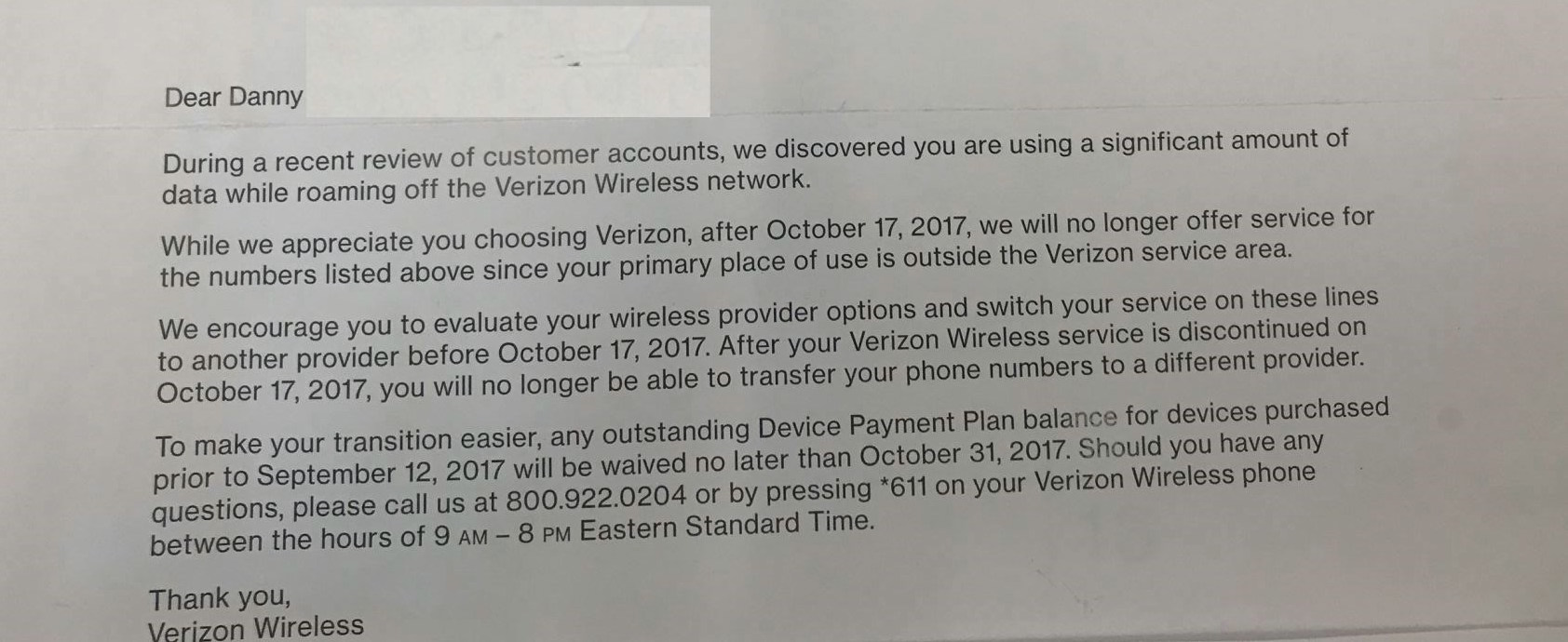 Image courtesy of WLBZ-TV
Image courtesy of WLBZ-TV
Verizon Wireless Cuts Off Thousands Of Rural Accounts For Roaming Too Much
If you live in rural America, the odds are you do quite a bit of roaming on your cellphone. Even if your home or business is in an area covered by a major national carrier, you likely have to regularly travel to, from, and through places where other providers pick up the slack. This means that rural customers who use their smartphones frequently can cost their carrier as they use gigabytes of data on other company’s networks. This cost has apparently become too much for Verizon, which is once again cutting off a block of rural customers, giving them only a few weeks’ notice to take their business elsewhere.
Multiple reports claim that Verizon recently notified 8,500 customers — representing a total of around 19,000 lines — that they have until Oct. 17 to find another wireless provider. Why? According to a letter posted by Stop the Cap, these customers are using “significant” amounts of roaming data.
The letters don’t give any approximation of what “significant” might translate into in terms of overall data use. They merely allege that the customers’ “primary place of use is outside the Verizon service area.”
If affected customers don’t meet the deadline given in the letter, they will be unable to transfer that number to another carrier, says Verizon.
On the plus side, Verizon is waiving any remaining balances these customers might have on devices purchased through the company. So folks could end up saving hundreds of dollars on iPhones they don’t need to finish paying off. That’s only good news if the customer is able to find another carrier who services their area.
In response to reports about the closed accounts, Verizon is attempting to downplay the impact, saying that only a small number of customers are being affected. While mathematically that is true — 19,000 is a negligible fraction of the company’s more than 100 million wireless subscribers — people in these communities are worried about the message it sends and the potential concerns for public safety.
In one Maine community, the local police chief is among those who received a tough-luck letter from Verizon.
“From a public safety standpoint, a lot of our 9-1-1 calls come in via mobile phone,” the chief explains to WLBZ-TV. “And when you have less towers or less service to ping off from, then your area of location instead of getting more specific in the location, is gonna get wider.”
Verizon confirmed to WLBZ that the decision to cut off these customers is purely a matter of red ink, saying that the “roaming costs generated by these lines exceed what these consumers pay us each month.”
The Federal Communications Commission, meanwhile, is considering a proposal that would determine that any customer who has access to mobile data services — just like the thousands of rural customers Verizon just cut off — to have adequate broadband access, despite the fact that home broadband availability in rural areas is sorely lacking.
This is actually the second wave of recent rural line cancellations by Verizon. Earlier this summer, Ars Technica reported that thousands of the company’s customers had been given similar notices, claiming they were roaming too much and therefore must be living outside the Verizon coverage area.
In 2010, Verizon launched a rural LTE program that partners with various smaller, regional providers to make sure that there was a blanket of wireless coverage for their customers.
At the time, Verizon was in the process of ending its initial unlimited data offerings and shifting toward a system that used strict monthly data limits with hefty overage fees. But in the last couple of years, Verizon and the other major national providers have once again drifted back to offering “unlimited” data plans.
As the Bangor Daily News recently noted, the consequence of this was that rural Verizon customers on unlimited plans were able to gobble up large amounts of roaming data, driving up costs for the nation’s largest provider.
Technically, the Verizon “unlimited” plan is much like the other “unlimited” wireless plans: It doesn’t have a monthly data cap, but Verizon can throttle users’ data after they reach 22 GB of data in any month. However, this throttling threshold isn’t automatic. Rather, Verizon only slows down affected users’ data when they are connected to congested cell towers. Since that’s a rare event in many rural communities, some Verizon customers were — gasp, horror — able to actually get the unlimited data they were paying for each month.
Verizon is effectively firing a warning shot to its rural customers: Dare to use your service as we advertise it, and we may just cut you off.
Want more consumer news? Visit our parent organization, Consumer Reports, for the latest on scams, recalls, and other consumer issues.

